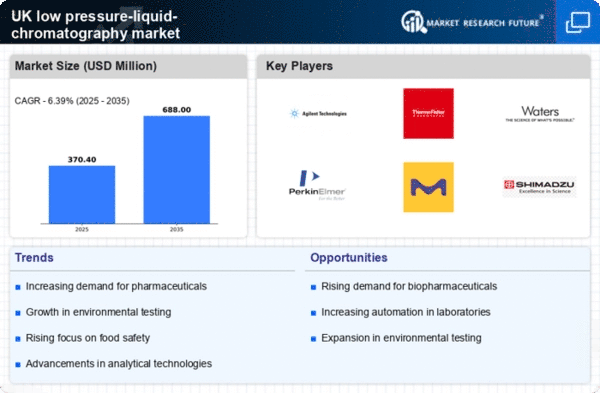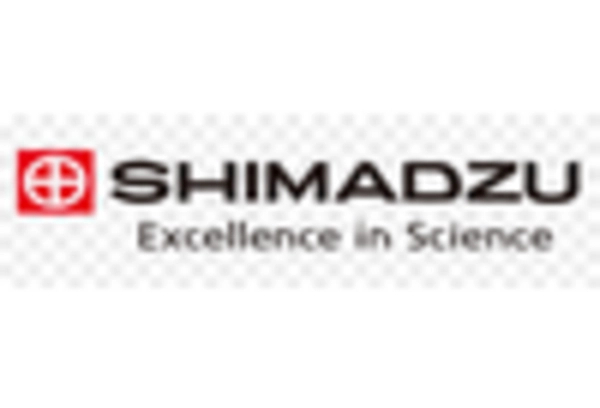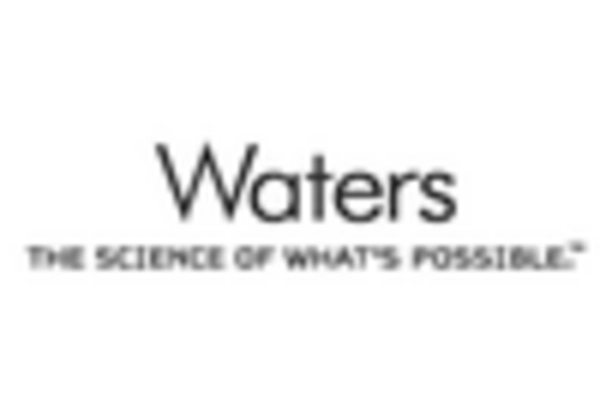Focus on Environmental Monitoring
Environmental monitoring is gaining traction in the UK, leading to increased demand for low pressure-liquid-chromatography market solutions. As concerns regarding pollution and environmental sustainability rise, regulatory agencies are emphasizing the need for accurate monitoring of environmental samples. Low pressure-liquid-chromatography is instrumental in analyzing pollutants and ensuring compliance with environmental regulations. The market for environmental testing is projected to expand by approximately 9% in the coming years, driven by the need for effective monitoring solutions. This focus on environmental health is likely to enhance the adoption of low pressure-liquid-chromatography technologies, as industries and government bodies seek reliable methods for assessing environmental quality.
Emerging Applications in Food Safety
The low pressure-liquid-chromatography market is witnessing a surge in applications related to food safety and quality control in the UK. With increasing consumer awareness regarding food safety, regulatory bodies are imposing stricter guidelines on food testing. This has led to a heightened demand for analytical techniques that can ensure compliance with safety standards. Low pressure-liquid-chromatography is particularly effective in detecting contaminants and verifying the authenticity of food products. The market for food safety testing is projected to grow by approximately 8% annually, indicating a robust opportunity for low pressure-liquid-chromatography technologies. As food manufacturers and regulatory agencies prioritize safety, the relevance of low pressure-liquid-chromatography is likely to expand.
Rising Demand in Pharmaceutical Sector
The pharmaceutical sector in the UK is experiencing a notable increase in demand for low pressure-liquid-chromatography solutions. This growth is primarily driven by the need for efficient drug development and quality control processes. As pharmaceutical companies strive to meet stringent regulatory standards, the adoption of low pressure-liquid-chromatography techniques is becoming essential. The market is projected to grow at a CAGR of approximately 6.5% over the next five years, reflecting the increasing reliance on these technologies for the analysis of complex mixtures. Furthermore, the ability of low pressure-liquid-chromatography to provide high-resolution separations is likely to enhance its appeal among pharmaceutical manufacturers, thereby propelling market growth in the UK.
Increased Research Activities in Academia
Academic institutions in the UK are intensifying their research activities, particularly in the fields of chemistry and biochemistry. This trend is significantly impacting the low pressure-liquid-chromatography market, as researchers require advanced analytical techniques to support their studies. The growing emphasis on research funding, which has seen an increase of around 15% in recent years, is likely to drive the demand for low pressure-liquid-chromatography systems. These systems facilitate the separation and analysis of various compounds, making them indispensable in academic laboratories. As universities and research institutions continue to invest in state-of-the-art equipment, the low pressure-liquid-chromatography market is expected to benefit from this surge in academic research.
Technological Integration in Industrial Processes
The integration of low pressure-liquid-chromatography technologies into industrial processes is becoming increasingly prevalent in the UK. Industries such as chemicals, petrochemicals, and biotechnology are adopting these systems to enhance production efficiency and product quality. The ability to automate and streamline analytical processes is a key driver for this trend. Companies are investing in low pressure-liquid-chromatography systems to reduce operational costs and improve throughput. The market is expected to see a growth rate of around 7% as industries recognize the benefits of incorporating advanced chromatographic techniques into their workflows. This shift towards automation and efficiency is likely to bolster the low pressure-liquid-chromatography market.
















